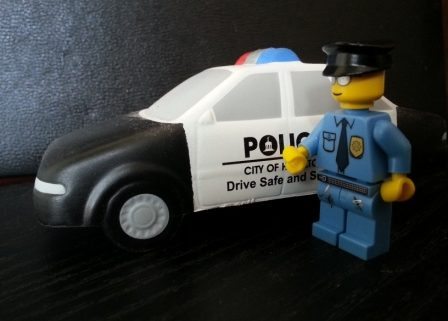I Don’t Believe That Police Can…
The chapter began with a detective thumbing the safety on his revolver. From there the author’s credibility tumbled downhill, taking a couple of really interesting characters with him. Where they went I’ll never know because I won’t bother to read another word in that particular book.
But, you say, it’s not your fault the police stuff is not spot on, because you went online and found all sorts of really cool police information. You know, like that site where the first paragraph started out with, “I don’t believe that police can…” Reading down a bit further on the page and we learn the author has complied a list of police facts regarding arrest, Miranda, crime scene investigations, etc. from another list generated by yet another group of writers who got their information from other writer websites. Together, they’ve created a one-stop shop for things WRONG about cops and their procedures and use of equipment
The first clue that you’ve landed on a website that probably can’t offer much more than what you already know, is a sentence that begins with “I don’t believe.”
Research is great, and every writer should at least dip a toe in the research pool every now and again. But please be sure the lifeguard is properly trained in the subject matter you seek. We can all read something and then relay our findings to others. However, a slight misunderstanding and/or twist of a word or its meaning can totally transform a really cool scene into a disaster.
If you’re unsure of a particular situation, tool, piece of equipment, procedure, rank, duty, assignment, ammunition, etc., then don’t use it in your story. Simple as that. Using incorrect information will serve only to confuse a number of your readers. So, instead of potentially losing fans, you’re better off making up something and in turn using your creative genius-type writing skills to help your readers accept whatever it is you’ve decided to use in place of fact. Believe me, it can be somewhat offensive to see your beloved profession butchered in a crime novel.
Think about it. Suppose you picked up a new book and this is what you find on page one…
Sara, a young ER doctor and part-time paperback novel writer, decided to go rogue and perform open heart surgery in the hospital waiting room. “Damn the hospital rules and regulations,” she said while thumbing the safety off on the Stryker SmartLife. “I’ve got a bone saw and I’m not afraid to use it.”
Suddenly, the ER doors pushed open and a tall, hard-bodied doctor from the CDC walked inside. His muscular shadow darkened the entire corridor. “No, Young ER Doctor, the feds are here now and I’m taking over,” said Mr. CDC. “You’re suspended and there’s nothing you or your chief of staff can do about it. And, dumbass, there’s no safety on a Stryker!”
Every nurse, orderly, and even most of the patients instantly fell in love with the tall FBI agent CDC guy. But the young ER doctor didn’t give up. Driven by her need to save the world one operation at a time, she raced her unmarked ambulance to the shipyard to meet with Ringo Swenson, a seedy thug who ran a covert surgery center in an abandoned cat litter factory. Swenson, she knew, would let her use the clandestine ER. She also knew enough about Sewnson’s secret, shady past that he’d also allow her the use of electricity, bottled water, and a saw or two. Maybe even a stapler, or some sutures.
Of course, Young ER Doctor was kidnapped the second she stepped inside the litter factory. Her daughter, the child she never knew she had until the last chapter, was also abducted, but not before leading the bad guys to her mother’s secret stash of high-tech medical tools. Then there was THE explosion at the hospital pharmacy. And…
If you can’t bring yourself to believe this about an ER doctor physician, then why should your readers be expected to believe the same about cops?
Please, do your homework. And please, for accuracy and those added dimensions of realism—hearing, touch, taste, etc., consult with someone who’s been there, done that. Anything else is flat, emotionless information, and it’s basically nothing more than hearsay.
Better still, sign up for a round or two of hands-on training, a ride-along, or an afternoon with an actual cop or other law enforcement professional. If your tale features an ER doctor physician, then by all means spend time with an actual ER doctor physician. Tour the ER. Visit a hospital. Peek inside an ambulance.
But whatever you do, do NOT rely on websites that begin their tutorials with “I don’t believe.”




